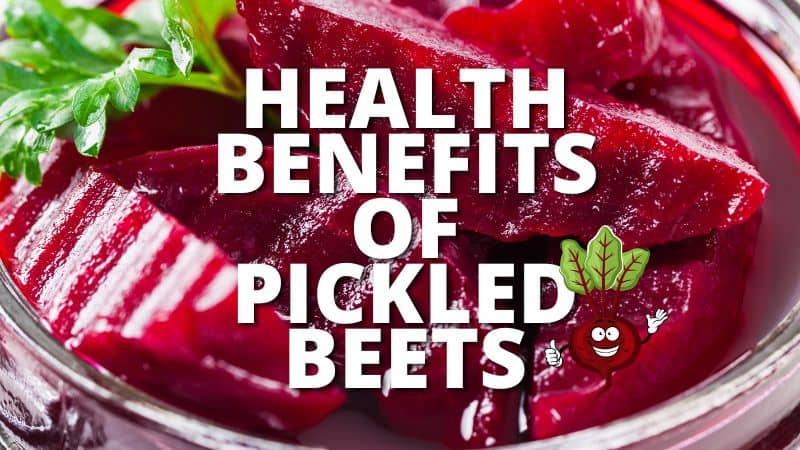Pickled beets are not just tasty, they also offer many health benefits.
These sweet and tangy vegetables are packed with important nutrients.
They are easy to store, last a long time, and are convenient to add to meals.
While fresh beets are healthy, pickled beets still keep many of the same good qualities.
Let’s highlight how they can help support your overall health in simple, effective ways.
1. A Nutrient-Rich Superfood in Your Fridge
Pickled beets contain a mix of essential vitamins and minerals that support different parts of your body.
They are rich in vitamin C, which helps your immune system fight off illness, and iron, which your body needs to make healthy red blood cells.
Potassium in pickled beets supports your muscles and nerves, helping them work the right way.
Folate, another important nutrient in beets, helps with cell growth and repairing body tissues.
The health benefits of beets are still present even after they are pickled, making them a convenient and lasting food choice.
Some people also drink beetroot juice for similar reasons, since it offers many of the same nutrients in a liquid form.
If you’ve ever wondered, “Are pickled beets good?”—the answer is yes, especially when added to a balanced diet.
📙 Potential Health Benefits of Cerasee
2. Supports Digestive Health with Natural Fiber
The fiber in pickled beets helps support regular bowel movements.
It also reduces bloating and can ease minor stomach issues.
This fiber feeds the good bacteria in your gut, which helps break down food properly.
A healthy gut can lead to better absorption of nutrients.
Including fiber-rich foods like pickled beets can keep your digestive system running smoothly.
📙 Potential Health Benefits of Bitter Leaf
3. Boosts Heart Health with Nitrates
Pickled beets are a natural source of nitrates, which your body turns into nitric oxide.
Nitric oxide helps relax and widen blood vessels, making it easier for blood to flow.
Better blood flow can help lower blood pressure, which is important for people with high blood pressure.
When your heart doesn’t have to work as hard to move blood, it stays healthier over time.
This may reduce the risk of heart disease, especially when nitrate-rich foods are part of your regular meals.
Adding pickled beets to a salad is a simple way to include them in your diet.
Eating beets regularly, along with other healthy foods, can support your heart and overall health.
📙 Potential Health Benefits of Bladderwrack
4. Enhances Athletic Performance Naturally
Beets are known for helping muscles use oxygen more efficiently.
This can lead to improved performance during workouts or physical activities.
Faster oxygen delivery may reduce fatigue and boost stamina.
Some studies suggest beets can shorten recovery time after exercise.
These benefits are useful even for non-athletes who want more daily energy.
📙 Potential Health Benefits of Labanos

5. Strengthens Immune System with Antioxidants
Pickled beets are a root vegetable that contains helpful antioxidants, which protect your cells from damage.
Two key antioxidants found in beets are betalains and vitamin C, both known for supporting immune health.
These compounds help the body lower inflammation and reduce harmful stress on cells.
When your body has less inflammation, your immune system can work better to fight off germs and illness.
Beets are also a good source of other nutrients like fiber and iron, which help your body stay strong.
Consuming beets regularly, whether pickled or cooked, may support your immune system over time.
Try adding them to a salad or side dish to make your meals healthier and more colorful.
📙 Potential Health Benefits of Escarole
6. Helps Regulate Blood Sugar Levels
Pickled beets have a low glycemic index, meaning they don’t raise blood sugar too quickly.
The natural fiber slows down the digestion of sugars.
This helps maintain steadier blood glucose levels throughout the day.
For people managing blood sugar, this makes beets a safer choice.
They can be part of a healthy plan when eaten in moderation.
📙 Potential Health Benefits of Paco
7. May Prevent Cancer Through Antioxidant Compounds
Pickled beets contain antioxidants that may help protect cells from damage that can lead to cancer.
One important group of compounds in beets is called betalains, which give beets their deep red color.
Betalains may help slow the growth of unhealthy or damaged cells in the body.
They also support the body’s natural process of removing toxins, which can lower the risk of cell damage.
Drinking beet juice or eating pickled beets as part of a healthy diet may add to your body’s defense system.
While more studies are needed to fully understand these effects, early research shows positive signs.
Beets are a nutritious food choice that may support long-term health when eaten regularly.
📙 Potential Health Benefits Of Burdock Root
8. Aids in Weight Management with Low Calories
Pickled beets are low in calories yet full of flavor and fiber.
This combination helps you feel full longer without overeating.
Their natural sweetness can also reduce cravings for sugary snacks.
Choosing low-calorie, high-fiber foods supports weight control.
Beets are an easy, satisfying option for anyone watching their weight.
📙 The Positive Health Impacts of Using Different Vegetables
9. Supports Brain Function and Focus
Better blood flow from dietary nitrates can help the brain get more oxygen.
This may lead to sharper thinking and better memory in some people.
Older adults may benefit from these effects the most.
Nutrients like folate in beets also support brain cell health.
Regularly eating beets may help maintain mental focus and clarity.
📙 Incredible Health Benefits Are Waiting
10. Consume in Moderation for Best Results
While healthy, pickled beets often contain added sugar and salt.
Too much of either can cancel out the benefits.
Eating them a few times a week in small amounts is usually enough.
Look for options with less sugar and sodium if possible.
Balance and variety are key to getting the most out of your diet.
💡 Conclusion
Pickled beets are a flavorful way to support your health.
They offer benefits for the heart, brain, immune system, and more.
Their fiber, vitamins, and natural compounds make them a smart addition to many meals.
Watch your portion sizes to avoid too much salt or sugar.
With careful choices, pickled beets can fit well into a healthy lifestyle.
⛑️ Safety First
Pickled beets may have health benefits, like helping with blood pressure or digestion, but these are not guaranteed.
Some of the benefits come from personal stories or early research, not strong proof.
People with kidney problems or those watching their salt or sugar intake should be careful.
Always talk to your doctor before adding them to your diet.
It’s also smart to do your own research and ask a health expert.
⚠️ Content Disclaimer
This article is for general information and may also be seen as entertainment.
It is not medical advice or a guide for health decisions.
Always talk to a doctor or health expert before making changes to your diet or health plan.
The facts shared here may not be complete or up to date.
Use this content at your own risk and always double-check with a trusted source.

